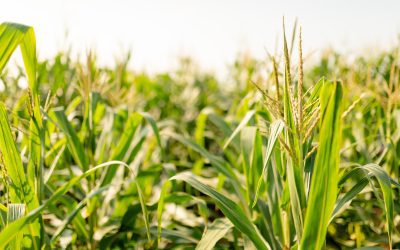Created by the Indiana General Assembly in 1975, the Indiana Grain Buyers and Warehouse Licensing Agency (IGBWLA) is established to administer the Indiana Grain Buyers and Warehouse Licensing and Bonding Law (IC § 26-3-7). IGBWLA’s responsibilities include the licensing and compliance of commercial operations who purchase grain from producers in Indiana.
Today, the agency operates as a regulatory division of the Indiana State Department of Agriculture (ISDA) with more than 200 licenses issued to grain elevators, warehouses, feed mills, ethanol plants, soybean processors and food grade facilities. Collectively, these licensees operate more than 325 grain facilities across Indiana and can store more than 630 million bushels of grain at a time.
On April 29, 2021, Gov. Eric J. Holcomb signed into law House Enrolled Act 1483. The new law amends certain grain marketing practices that are important for both grain producers and grain operations to be aware of. To better understand these changes, lets dive into each one below.
Crop year
The new law adopted and implemented USDA’s definition of a “crop year.” Under the definition, the term “crop year” means the period from one year’s harvest to the next year for a specified field crop as follows:
• June 1-May 31 for wheat, wheat seed, barley, barley seed, rye, rye seed, oats, and oat seed
• July 1-June 30 for canola, canola seed, lentils, and lentil seed
• Sept. 1-Aug. 31 for corn, corn seed, soybeans, soybean seed, popcorn, popcorn seed, sorghum, sorghum seed, sunflower, sunflower seed, and all other field crops and other field crop seed
Starting after July 1, this new definition will affect how producers are able to market their grain delivered to a licensee on a deferred pricing agreement.
Deferred Pricing Agreements
The new law also adds an entire section regarding new and existing deferred pricing agreements to the statute. People may also refer to deferred pricing as “delayed price” or simply by its abbreviation “DP.”
What does the law say about new deferred pricing agreements?
After July 1, a licensee may not enter into a deferred pricing agreement with a grain producer that extends beyond the crop year for the delivered grain or transfer the deferred pricing agreement to a new contract beyond the crop year for the delivered grain. IC § 26-3-7-26.5 (a)
Key points
How does this law affect my grain marketing practices going forward?
After July 1, producers will only have one crop year as defined by the law to price their grain that is delivered to a licensee on a deferred pricing agreement. For purposes of IC § 26-3-7-26.5 (a), the term “price” means either the full cash price is established (i.e., both the commodity futures and basis values have been applied to the deferred pricing agreement) or the basis value is established before the end of the crop year as defined by the law.
• Example No. 1 – If a producer delivers 1,000 bushels of corn to a licensee on a deferred pricing agreement on
Oct. 12, 2022, all 1,000 bushels must be priced no later than Aug. 31, 2023 (i.e., the end of the crop year).
• Example No. 2 – If a producer delivers 1,000 bushels of corn to a licensee on a deferred pricing agreement on
June 4, 2023, all 1,000 bushels must still be priced no later than Aug. 31, 2023 (i.e., the end of the crop year). What does the law say about existing deferred pricing agreement?
If a producer has delivered their grain to a licensee on a deferred pricing agreement before July 1, 2021, the licensee must complete its full payment obligations to the producer under the agreement before Jan. 1, 2024. IC § 26-3-7-26.5 (b) What does this mean for producers who currently have grain on a deferred price agreement?
If a producer has delivered any grain to a licensee on deferred price before July 1, 2021, and the producer has not fully priced and/or accepted full payment for the grain, the licensee must price and fully pay the producer for the grain before Jan. 1, 2024. Can a producer request a licensee to continue holding payment after Dec. 31, 2023, for grain that was delivered on a deferred pricing agreement before July 1, 2021?
No, licensee’s may not hold any payments after Dec. 31, 2023, for grain that was delivered on a deferred pricing agreement before July 1, 2021.
Contract language update
The law added new language to the risk notice that licensees are required to have in certain contracts when purchasing grain from producers. This new language addresses grain that is delivered on a deferred pricing agreement after July 1, it and stipulates that producers must price their grain within the new definition of the term “crop year.”
The updated risk notice should be found immediately above the place on the contract where the seller of the grain must sign and now reads as follows:
Notice – Seller is cautioned that contracting for the sale and delivery of grain involves risks. These risks may include future payments by you to maintain this contract, a lower sales price, and other risks not specified.
Indiana State Law requires that after July 1, 2022, all deferred priced grain must be priced within the crop year as defined by IC 26-3-7-2(7). This contract must be price by (insert date).
Coverage under the Indiana Grain Indemnity Program is for grain that has been delivered to a first purchaser licensee within the 15 months before the date of failure and is limited to 100 percent of a loss for stored grain and 80 percent of a loss for other covered contracts.
Be sure you understand the nature of this contract and the associated risks. How does this risk notice affect producers when delivering grain on a deferred pricing agreement?
After July 1, all producers who deliver grain to a licensee on a deferred pricing agreement should see the last date of the crop year, as defined by law, for the specific crop inserted on the designated “(insert date)” line in the risk notice. What if a producer delivers grain to a licensee on a contract that is not a deferred pricing agreement?
If grain is being delivered on a contract that is not a deferred pricing agreement, the licensee should insert “Not Applicable” on the designated “(insert date)” line in the risk notice.
ISDA and IGBWLA encourages producers to start talking to their grain buyers today to learn more about how their companies will be implementing these new pricing and payment procedures.
Producers are also encouraged to seek advice from their own legal counsel, accountants, creditors, and other trusted financial professionals to help better prepare their farming business for any potential changes in their grain marketing practices.
For questions regarding these law changes, or other grain related matters, contact the agency’s office by phone at 317- 232-1360 or by email at ingrainbuyers@isda.in.gov.



